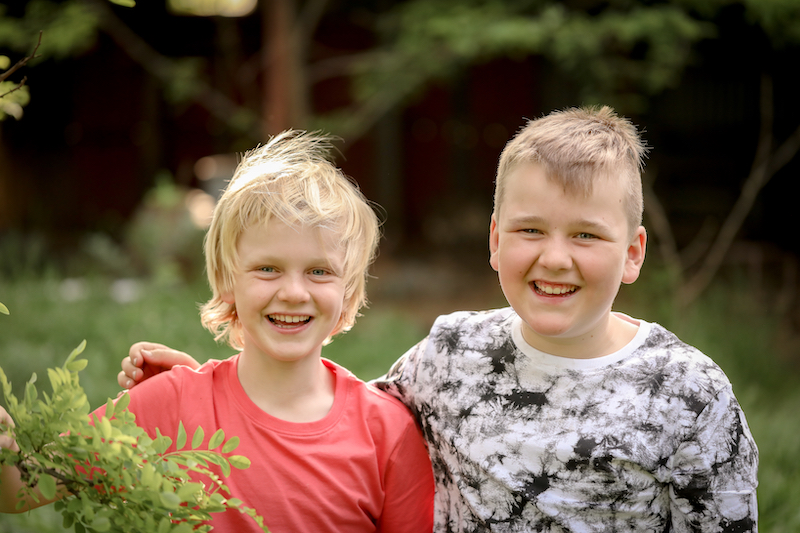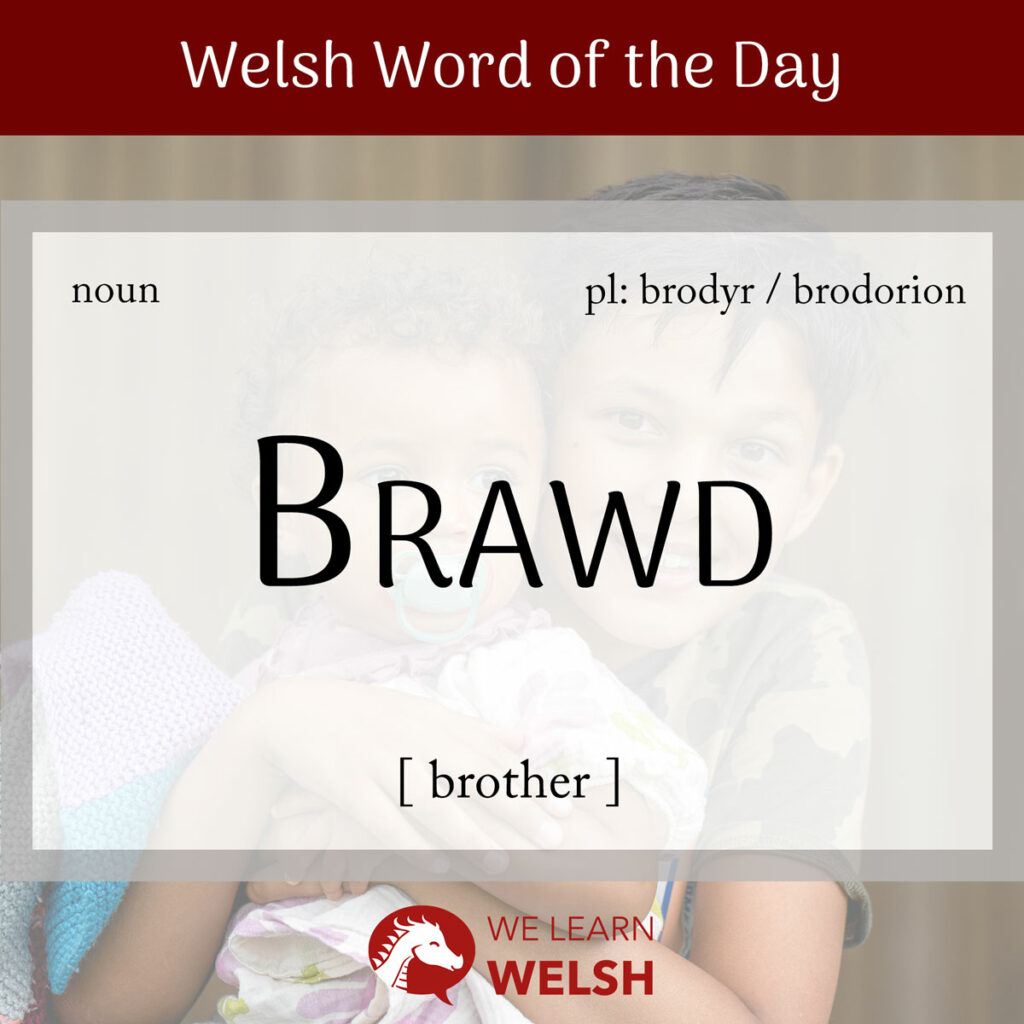Oes gennych chi frawd? (Do you have a brother?) Whether older or younger, having a brawd (brother) can be a huge pain. I wouldn’t change mine for the world, but don’t tell him I said that.
brawd
brother
In old-fashioned Welsh, the plural form of brawd was brodorion, but today we use brodyr (brothers). It’s important to remind yourself that this means brothers and not brother, because it sounds so much like the English singular word.
In fact, Welsh brawd and English brother do come from the same etymological source, which is a proto-Indo-European root word that would have been something like *bhrehter. While the modern English word travelled to us through the Latin frater, the Welsh would have likely been in proto-Celtic *bratir and later, in proto-Brittonic, *brodr.
Obviously, brawd is a masculine noun. The feminine sister is chwaer, and sibling is just sibling, though this isn’t commonly used in Welsh at all.
Soft mutation
frawd
Nasal mutation
mrawd
Aspirate mutation
N/A
Brawd, being masculine, doesn’t mutate after y (the), and adjectives following it also remain unchanged. While this simplifies things a bit, it’s still important to be mindful of its mutations in other contexts.
It can be challenging to pronounce the sound mr in mrawd if you’re a new speaker. There’s two ways to deal with this.
Firstly, you can insert a vowel in between m and r, so that you’re saying myrawd, or muh-roud in English spelling. Then you can try to shorten the vowel each time you say it until you’re able to pronounce it accurately.
The other option is to learn to pronounce the word is context. Mrawd only appears in phrases, and most commonly by far in fy mrawd (my brother). So what you can do is affix the m to the end of the word fy (my), so that you’re saying fym rawd, or vum roud in English spelling. If you’re speaking a full natural sentence without lots of gaps between words, this will sound completely natural.
Dw i’n caru fy mrawd.
I love my brother.
The word brawd is usually used to refer to a biological brother with whom one shares two rhieni (parents). However, there are many other types of brother as well:
- hanner brawd = half-brother
- brawd unfam = half-brother, sharing a mother
- brawd undad = half-brother, sharing a father
- llysfrawd = stepbrother
- brawd maeth = foster brother
- brawd yng nghyfraith = brother-in-law
- brawd ffydd / brawd crefydd = brother in faith
Like in English, brawd can be used to mean close friend (cyfaill), or convey shared membership in a particular society or religious groups. It also means brother as in friar. For example, the Franciscan Friars are the Brodyr Llwydion (Grey Brothers).
Every teulu (family) is different, and it’s definitely worth learning to describe yours as it’s one of the first conversations you’ll have in any new language!
Fo oedd fy unig frawd.
He was my only brother.
If you tell someone mae gen i frawd (I have a brother), they may ask whether you mean a brawd iau (younger brother) or a brawd hŷn (older brother). If you or your brodyr (brothers) are quite young this may then become a conversation about his exact oedran (age). For example, my brawd bach (little brother) is un ar bymtheg mlwydd oed (sixteen years old).
Whoever you’re speaking to is likely to also want to know faint o frodyr (how many brothers) you have. This is pretty simple – just put the relevant number, most likely un (one), dau (two), or tri (three), in front of the word brawd.
In the case of dau, this causes a soft mutation so it’s dau frawd. If you have as many as five (pump), there’s also a slight difference – pump drops its final p in front of nouns, becoming pum brawd. Un brawd, tri brawd, and pedwar brawd stay as they are.
Mae gennych chi ddau frawd ac un chwaer.
You have two brothers and one sister.
Note that you use brawd (brother) not brodyr (brothers) even when you’re actually talking about multiples – in Welsh you don’t need to use the plural form of a noun when counting. However, you would use the plural to say does gen i ddim brodyr (I have no brothers / I don’t have any brothers). In casual speech, this might well be shortened to ‘S’gen i’m brodyr.
Another option when counting in Welsh is to insert the preposition o (of) between the number and the noun. In once sense, this makes things a bit easier because Welsh uses the plural after o, which is closer to what happens in English. Also, in this case, pump stays intact, meaning that five brothers is pump o frodyr.
Either phrasing is very normal. You could even say brawd mogi yw tagu (there’s no difference between them), although this isn’t the most pleasant idiom as it literally means choking is the brother of suffocating.
Aside from brodyr and chwiorydd (sisters), you may want to discuss other family members such as mam (mum), tad (dad), plant (children), your priod (spouse) who may be a gwraig (wife) or a gŵr (husband), and even anifeiliaid anwes (pets). And if your brawd has his own plant, these are your nithoedd (nieces) and neiaint (nephews).
Fy nai fab brawd ydy o.
He’s my nephew by my brother.

Brawd also used to be used as a synonym for barn (opinion, verdict, or judgment), particularly in formal or religious settings. This usage has a separate etymology, coming from the proto-Celtic *bratus, and was actually usually considered a feminine noun. The plural was brodiau or brawdau.
Using brawd in this way is not common at all nowadays. The only context in which you might come across it is in reference to the Day of Judgment, which some older Welsh Christians may call Dydd y Frawd. As you can see, it’s mutated here after the y because feminine nouns take a soft mutation after the definite article. This has no relation to the word brawd meaning brother.
Carennydd (kinship) is important to the Welsh, and this is reflected in our chwedloniaeth (mythology), such as in the famous stories of the Mabinogion. In one story relating to the life of the Princess Branwen, she sends a tame bird across the sea from Ireland to her brawd, the giant Brân (also known as Bendigeidfran). As Branwen had taught the bird to speak, it’s able to tell Brân that her husband, the King of Ireland, is mistreating her, and he crosses the sea to save her. Couldn’t we all do with a brawd like Brân!

